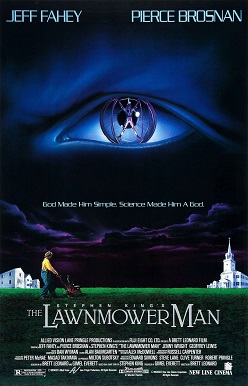 Image via Wikipedia
Image via WikipediaWhen director Brett Leonard's science-fiction movie The Lawnmower Man was released in 1992, New Line Cinema tried to convince us that it was based on Stephen King's short fantasy story of the same name. It wasn't, and I think this is the main reason why such a great film opened to mixed reviews.
After a chimp kills several guards and escapes, pacifist Peter quits his job at secretive Pentagon contractor Virtual Space Industries, and moves the experiment to his garage. He plans to eliminate the "aggression factors" and focus on intelligence boosting and its civilian applications. Wanting a human subject, he recruits mentally-disabled assistant gardener Jobe Smith (Jeff Fahey).
The experiment on Jobe is a great success; before long, he's straightened up his appearance, ceased to be a target of bullying (including whippings by his Catholic priest), and lost his virginity.
As the experiment continues, Jobe's intelligence gain accelerates. Soon, he's acquiring a four-year degree worth of education every few days, while still working diligently and full-time to mow lawns. But when he begins (accidentally, at first) to read minds and perform telekinesis, Peter fears he's moving too fast.
This prophetic film is the first I've seen that combines the full-immersion virtual reality of the Matrix Trilogy
with the mind uploading of Ghost in the Shell
The animation is also excellent for its time, though understandably dated (particularly the low-polygon virtual reality landscapes), and it integrates well with the live-action sequences. Fahe does a great job making Jobe's transition from victimized idiot to successful genius to avenging demigod clear and plausible.
There's no attempt to explain how Jobe can parlay his newfound intelligence into psychic powers; apparently it involves secrets that occult mages have long known, but no exposition of magick is provided. While I like to see an occult flavour and a dash of Clarke's Third Law in my science fiction, I found these powers the least plausible aspect of the film. This is a shame: a few well-written scenes about the computational nature and hackability of the universe could have kept them well within the realm of hard science fiction. It's also unclear what phenomenon Jobe plans to exploit to convert himself to a digital form.
Quibbles aside, though, The Lawnmower Man was an excellent film. Calling it a Stephen King adaptation was a deplorable act of fraud, for which King rightly sued and won. But a movie can't be blamed for bad marketing decisions. It must stand or fall on its own merits, and The Lawnmower Man stands tall and triumphant.
The VHS release

![Reblog this post [with Zemanta]](http://img.zemanta.com/reblog_e.png?x-id=930e9d7b-f24e-41d3-8327-feae3ceb9618)



No comments:
Post a Comment
Note: Only a member of this blog may post a comment.